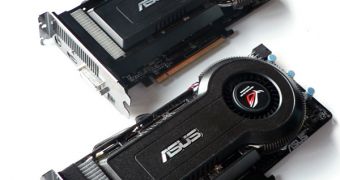ASUS, one of the leading manufactures of graphics cards and motherboards, is planning to release a couple of new NVIDIA and AMD-based video cards, designed for the mainstream desktop computer users. The upcoming cards will be part of the company's Matrix lineup, which was showcased for the first time at this year's Computex show in Taipei. They will be equipped with a custom cooling solution, and are set to boost graphics performance (compared with reference models) for desktop computer systems.
Pictures of the upcoming cards have just recently been spotted on the XFastest forum but, other than that, no technical details are available at this point in time. According to a post on the aforementioned forum, the cards will be based on NVIDIA's 9800GT, 9600GT GPUs and AMD's highly successful HD4850.
The 9600GT-based card looks rather similar to one of ASUS' current cards, also based on the 9600GT GPU and part of the Matrix lineup. The other two cards are both equipped with the same dual-slot custom cooling solution, clearly distinguishable for its ASUS and Republic of Gamers (ROG) logos. Given the cooling solution, it’s possible that the future cards also feature factory overclocked GPU and memory clock rates.
Unfortunately, nothing related to a specific release date and pricing has been made public so far. Nevertheless, the leaked photos could offer an indication as to the cards being already ready for launch, which, in turn, would mean gaming enthusiasts out there wouldn’t need to wait much longer for them. As for pricing, the 9600GT-based card could come as a rather affordable upgrade for gamers on a budget, but confirmation is still pending on that one.
Currently, ASUS boasts a vast range of AMD and NVIDIA-based graphics, offering users both reference models and factory overclocked solutions. The upcoming cards have been designed for those users who won't settle for standardly-equipped video cards, looking instead for a solid solution for their high-performance or mainstream desktop computer systems.

 14 DAY TRIAL //
14 DAY TRIAL //